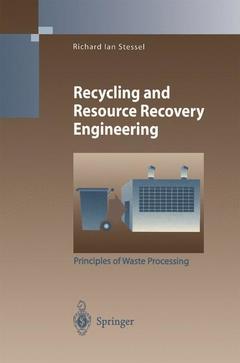Recycling and Resource Recovery Engineering, Softcover reprint of the original 1st ed. 1996 Principles of Waste Processing Environmental Engineering Series
Langue : Anglais
Auteur : Stessel Richard I.

Solid waste is one of the newest fields to achieve recognition as a sub-discipline in environmental engineering. As such, one is hard-pressed to find thorough coverage of related topics in academic curricula. Many graduate programs in environmental engineering have one introductory course in waste control. A handful of texts, some excellent, exist to serve this need. Recent purported crises in solid waste management have forced the understanding that something beyond the traditional control methods may be appropriate. Resource recovery is the correct nomenclature for the longest standing alternative approach seeking to extract materials from the waste stream for eventual re-use in one or another beneficial fashion. Several books have evolved, covering various approaches. Design approaches therein have borrowed heavily from other disciplines, ceasing where solid waste differs from the feeds to be processed. These books were oriented towards knowledgeable practitioners. This work attempts to present waste processing as a study in unit operations appropriate to university study at the graduate level. The study of unit operations is typical in environmental engineering. These unit operations are different. A variety of student backgrounds are suitable. However, a familiarity with the basics of waste control, such as would be gained from one of the introductory courses mentioned above, is assumed, as is a sound quantitative background. It is hoped that this work fills an empty niche. Contents 1 Waste as a Resource . . . . . . . . . . . . . . . . . . .. . . 1 . . . . .
1 Waste as a Resource.- 1.1 Political Background.- 1.2 Resource Economics.- 1.3 Recycling.- 1.4 Automated Processing.- 2 Waste Analysis.- 2.1 Waste Sampling.- 2.2 Waste Composition.- 2.3 Determination of Waste Properties.- 2.4 Energy Recovery Assessments.- 2.5 Hazardous Waste Aspects.- 2.6 The Waste Analysis Laboratory.- 3 System Design.- 3.1 Design of Recycling Systems.- 3.2 Design of Process Trains.- 3.3 Product Design for Recycling.- 3.4 Efficiency of Unit Operations and Systems.- 3.5 Conveyance.- 3.6 Safety.- 4 Energy Recovery.- 4.1 Combustion Equipment.- 4.2 Energy Recovery Analysis.- 4.3 Emissions.- 4.4 Residue Control.- 4.5 Refuse-Derived Fuel.- 5 Size Reduction.- 5.1 Volume Reduction.- 5.2 Particle Size Reduction.- 6 Fluid Separation.- 6.1 General Theory of Fluids Separation.- 6.2 Categories of Fluids Separators.- 6.3 Air Classification in Waste Processing.- 7 Screening.- 7.1 Flat Screens.- 7.2 Screening Theory.- 7.3 The Trommel and Related Theory.- 7.4 Trommel Operation.- 8 Metals Recovery.- 8.1 Ferrous Metals Separation.- 8.2 Non-Ferrous Metals Separation.- 9 Detect-and-Route Systems.- 9.1 Detect-and-Route System Configuration.- 9.2 Glass Separation.- 9.3 Plastics Separation.- 10 Digestion.- 10.1 Current Methods of Degradation.- 10.2 Optimization of Degradation.- 10.3 Implications of Optimized Aerobic Landfill Degradation.- 10.4 Processing of Degraded Waste.
This book covers mechanical processing of solid waste. It moves beyond a basic understanding of waste control to encompass waste processing as an industry expected to take its place alongside existing industrial raw materials suppliers. The author begins by describing the industry as it should develop, and then presents an advanced discussion of waste analysis. The focus is on understanding principles of operation, from combustion and degradation through a series of unit operation used in the mechanical processing of waste. The author presents the type of understanding necessary to undertake recycling and resource recovery with a cost-effective industrial approach.
Date de parution : 12-2011
Ouvrage de 263 p.
15.5x23.5 cm
Thèmes de Recycling and Resource Recovery Engineering :
Mots-clés :
© 2024 LAVOISIER S.A.S.



